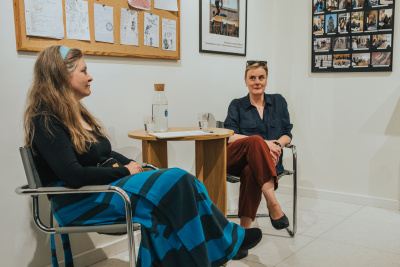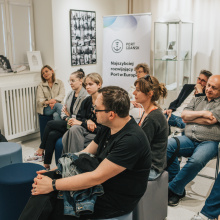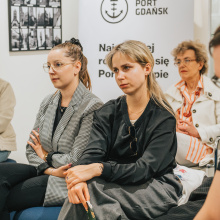
Photo by Filip Śmigielski
‘Wars, disasters, and mental well-being. How to take care of your emotions in a disturbing reality?’ was the topic of the last meeting of the semester in the series ‘What does science say? (Non-)academic meetings’ at the University of Gdańsk Museum. What can we do to take care of our well-being? What role do other people play in this, and what about the mysterious vagus nerve? Dr Agata Rudnik, psychologist and director of the Academic Psychological Support Centre at the University of Gdańsk, talked about ways to deal with difficult emotions in turbulent times.
The June meeting in the series ‘What does science say? (Non-)academic meetings’ enjoyed exceptional attendance - additional seats had to be brought into the intimate temporary exhibition hall at the University of Gdańsk Museum. For some of the guests, this was not their first encounter with science in the form proposed by the UG Museum on the occasion of the university's 55th anniversary. The idea behind the ‘(non)academic meetings’ was to bring science to the people and discuss current, important social issues.
‘We would like to invite you to our discussion, so that it can be a safe space to talk about what is on our minds,’ encouraged dr Agata Rudnik at the beginning of the meeting, referring to her own work in a hospital gastroenterology ward.
How to cope with a disturbing reality? First of all, it is worth remembering that the various negative emotions and reactions (e.g. anxiety, difficulty sleeping) we experience are completely natural. And what can we do to help ourselves?
Acceptance
‘I feel that we devote a lot of time and energy to fighting something. To be better, smarter, earn more money,’ noted dr Agata Rudnik. Meanwhile, fighting is not always the best choice at a given moment:
‘Sometimes you have to accept something. We shouldn't fight the fact that sometimes we feel sad or find things difficult, because sometimes we just have to go through it and we need it (...) If we didn't experience stress, we wouldn't even have left the cave. Stress can therefore be motivating and conducive to development - the problem arises when we experience it chronically.’
The intestines, the brain and the mysterious vagus nerve
‘Imagine a fluffy kitten. You have as many neurons in your intestines as a cat has in its brain, so you really need to take care of what goes on in there.’
It is therefore worth taking care of your microbiome, the ‘good bacteria’ that perform protective functions. How can you do this? It is worth eating fermented foods and going for walks in the forest, because they allow us to absorb beneficial microorganisms from the air.
It is also worth remembering the vagus nerve. It is the tenth cranial nerve, which connects the brain to the intestines (among other things) and is responsible for the ‘chill’ response. Paradoxically, stimulating it helps us calm down. The vagus nerve is part of the parasympathetic nervous system, which is associated with calming the body (as opposed to the sympathetic nervous system, which is responsible for the stress response and the release of cortisol and adrenaline).
What are some ways to stimulate the vagus nerve when we start to feel overwhelmed? The simplest is to wash your face with cold water. Another way is to sing or hum while meditating.
Get moving! But in a way you enjoy
‘Have you heard that you should take 10,000 steps a day? Well, there are absolutely no studies that say how many steps are needed,’ joked dr Agata Rudnik. ‘Even if we take 5,000 or 4,000 steps, it's still more than zero.’
However, movement is important. We need what is known as behavioural activation: doing something makes us feel better. It doesn't have to be anything spectacular. It is worth finding an activity that we enjoy. A good idea might be swimming or walking in the woods, or so-called ‘forest bathing’ (shinrin yoku), which in Japan is even prescribed by doctors.
Information overload... and misinformation
How to stay up to date and not go crazy? It is worth implementing a few rules.
‘Sometimes we forget to verify the news. We know that there are people in the world who want us to be afraid and worried, because then it is easier to control us,’ said A. Rudnik. ‘However, from a psychological perspective, I would not say that we should not read anything. It is important to set certain boundaries.’
So you can set aside time for reading the news (preferably not before bedtime) and remember to verify it.
People give strength
It turns out that valuable social relationships are one of the factors that best protect against bad moods. So, contrary to the urge to ‘hide in a hole’, it is worth going out to meet people, meeting someone, calling someone you haven't spoken to in a long time. Of course, with the proviso that these are not people who make us feel bad. Each of us also has a slightly different level of ‘social battery’. Nevertheless, it is worth taking care of relationships.
‘Let's remember that when we hug other people, we release oxytocin, the attachment hormone. And ladies and gentlemen, when we have a deficiency of this hormone (and a deficiency of relationships), the same areas of our brain that are responsible for physical pain are activated. This means that we experience loneliness physiologically.’
Seeking help
Evolution, not revolution – according to the guest of the UG Museum, this is how we should approach self-care. This can also be applied to the change that is taking place in society in terms of attitudes towards therapy and psychological help. While people from the older generation are often reluctant to seek professional help, for younger people it is something completely natural.
Interesting fact: film promoting mental health care for men
The PERMA model
This model, jokingly presented as a ‘free’ meeting, was developed by Martin Seligman. It identifies five factors that contribute to life satisfaction. These are:
- P - positive emotions
- E - engagement
- R - relationships - being among people, cooperation
- M - meaning, i.e. a sense of purpose/meaning in what we do
- A - accomplishment
What can also help us is the awareness of how much we do for our mental health without even knowing it. It turns out that just reading or listening about mental health makes us feel better.
‘What's more, I'll let you in on a secret: reading about getting rich also makes us feel richer,’ joked Agata Rudnik at the end of the meeting. ‘It's important to remember that!’
Agata Rudnik was interviewed by Karolina Żuk-Wieczorkiewicz.



